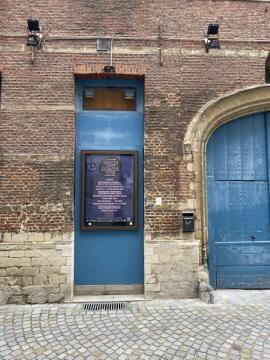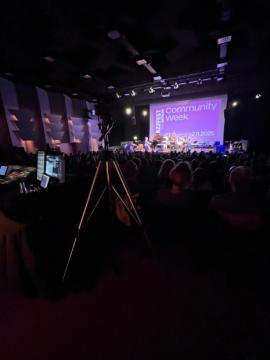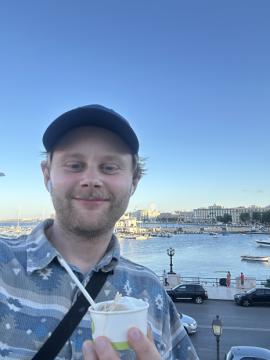Back to list
Previous participant: Jón Ómar Árnason
From: Reykjavik Jazz Festival (Iceland)
To: Manchester Jazz Festival (UK)
16 - 23 March 2019
To: Manchester Jazz Festival (UK)
16 - 23 March 2019
I stayed with Manchester Jazz Festival (or mjf) for a week in March 2019. The festival itself takes place in May but on the advice and previous experience of Artistic Director and CEO, Mr. Steve Mead, I decided to visit a couple of months before. The main reason for visiting earlier is that during the festival itself the team is extremely busy 24 hours a day and has very little, if any, time to spend with visitors wishing to discuss things and get answers to questions. After all, the main purpose of the visit was to get a deeper understanding of the organisational and planning systems of mjf and to speak to various members of the team to get more insight into how things work and are managed.
Manchester Jazz Festival is at a crossroads in a few different ways this year. They have moved the festival forward in the calendar year from late July to the latter part of May. The main festival hub has also been moved from Albert Square while the town hall is being renovated. The new location is at St Ann‘s Square and Exchange Street with a host of free stages, food stalls and festival bars. In addition, the festival will take place in various venues in the Northern Quarter as well as around the Royal Northern College of Music. Last but not least, a big change is in the duration of the festival as it now takes place over five days which is considerably shorter than in previous years.
I spent much of Monday with Steve Mead (Artistic Director/CEO) discussing policy structure and diversity issues with regard to programming the festival. For a small festival like Reykjavik Jazz Festival it is important to be able to structure the application procedure for artists and I was able to gain valuable insight into how it is done at mjf. Another important topic we discussed was diversity in programming. At Reykjavik Jazz Festival we are actively seeking to attract female artists in more capacity and I was able to learn about the Keychange program which encourages festivals to achieve a 50:50 gender balance by 2022, a figure which MJF has already achieved in their festival programming.
Tuesday started with a walk around town with Jessica Elouahbi Mallard (Assistant Producer) where she showed me various venues where gigs will be put on as well as the outdoor strip where the free open air gigs will take place. Upon returning from the venue tour I sat down with Steve Mead to discuss artists‘ pay structure and various other topics e.g. commissioned work, different types of venues and different types of events at a festival. A panel discussion at Reykjavik Jazz Festival could be an opportunity to raise awareness and address topics which would not otherwise be talked about so much. I was later invited to a meeting with Steve, Jessica, Angela Kirk (Communications Director) and Matt Tarbuck (Production Manager) to discuss the organisation and layout of the open air strip near St Ann‘s Church which will have three stages, bars and food stalls.
Wednesday morning I sat down with Nathan Bragg (Festival Programme Assistant) to discuss the actual organisation of the programming process. It was a very useful overview of how they summarise all the relevant information about each performance (including photos etc.) at the festival so it‘s easy and accessible if and when needed. We also looked at and discussed the contracts used for artists who play at mjf. In the afternoon I had a meeting with Steve and Nathan about mjf hothouse, a talent development scheme run by the festival. It’s a 10 week program, run each spring and fall and has been going for two years now. It gives emerging artists the opportunity to be coached and mentored by established musicians in the region. It’s a free scheme for artists looking to develop ideas, hone their craft and move their careers onto the next step. MJF offers industry mentoring, paid rehearsal time, bespoke workshops and a final performance workshop where participants gain industry feedback on the work they present, whatever stage it’s at. The scheme has been a success so far and one participant from two years ago will actually be performing at mjf in May.
Thursday started with a meeting with EJ Trivett (Executive director) about sales and sponsorships. We discussed how the team looks after sponsors and what their expectation of return is and what kinds of activities they value. There are a few different types of funding and sponsorship in place for mjf and we discussed those and how their experience could perhaps give us ideas about how to create more funding opportunities for Reykjavik Jazz Festival. In the afternoon I had a meeting with Angela to discuss the marketing strategies of mjf. They have decided to rebrand the festival in some ways this year (another big change for them!) and done a lot of work to make their website more user friendly and accessible. They‘ve also put a strong emphasis on ‘mjf‘ as their name (in lowercase letters) instead of ‘Manchester Jazz Festival‘. Various platforms to reach out to their audience was discussed as well.
Friday started with a meeting with Hannah Fry (Volunteer coordinator) to discuss how mjf manages volunteers leading up to and during the festival. MJF is very proud of their volunteers and strong emphasis is put on making them feel as part of the mjf team. Being a not-for-profit charity it is vital for the festival to have a team of dedicated volunteers to help stage the festival each year and without them the event simply could not happen. This year the estimated number of volunteers is somewhere between 150-200. In the afternoon I had some very good discussions with Steve about various topics relating to programming and staging a great jazz festival. I also got to meet and chat with award-winning composer Andy Scott who will open mjf 2019 in a citywide mass participation event.
To conclude, I spent a highly informative and thought-provoking week in Manchester with the mjf team. I really can‘t thank them all enough as I was made to feel very welcome by everybody and right from the start they were all eager to share information and experience with me which I found to be very valuable. During my stay I was able to attend a few jazz gigs in Manchester as well as a ‘Both Sides Now : International Showcase‘, the premiere of a brand new European music commission, offered by Brighter Sounds and Manchester City Council. My hope is that I can visit mjf again in May to experience this great jazz festival myself. Thank you so much EJN for giving me the opportunity to take part in this exchange program, it‘s innovative, important and very beneficial.
Manchester Jazz Festival is at a crossroads in a few different ways this year. They have moved the festival forward in the calendar year from late July to the latter part of May. The main festival hub has also been moved from Albert Square while the town hall is being renovated. The new location is at St Ann‘s Square and Exchange Street with a host of free stages, food stalls and festival bars. In addition, the festival will take place in various venues in the Northern Quarter as well as around the Royal Northern College of Music. Last but not least, a big change is in the duration of the festival as it now takes place over five days which is considerably shorter than in previous years.
I spent much of Monday with Steve Mead (Artistic Director/CEO) discussing policy structure and diversity issues with regard to programming the festival. For a small festival like Reykjavik Jazz Festival it is important to be able to structure the application procedure for artists and I was able to gain valuable insight into how it is done at mjf. Another important topic we discussed was diversity in programming. At Reykjavik Jazz Festival we are actively seeking to attract female artists in more capacity and I was able to learn about the Keychange program which encourages festivals to achieve a 50:50 gender balance by 2022, a figure which MJF has already achieved in their festival programming.
Tuesday started with a walk around town with Jessica Elouahbi Mallard (Assistant Producer) where she showed me various venues where gigs will be put on as well as the outdoor strip where the free open air gigs will take place. Upon returning from the venue tour I sat down with Steve Mead to discuss artists‘ pay structure and various other topics e.g. commissioned work, different types of venues and different types of events at a festival. A panel discussion at Reykjavik Jazz Festival could be an opportunity to raise awareness and address topics which would not otherwise be talked about so much. I was later invited to a meeting with Steve, Jessica, Angela Kirk (Communications Director) and Matt Tarbuck (Production Manager) to discuss the organisation and layout of the open air strip near St Ann‘s Church which will have three stages, bars and food stalls.
Wednesday morning I sat down with Nathan Bragg (Festival Programme Assistant) to discuss the actual organisation of the programming process. It was a very useful overview of how they summarise all the relevant information about each performance (including photos etc.) at the festival so it‘s easy and accessible if and when needed. We also looked at and discussed the contracts used for artists who play at mjf. In the afternoon I had a meeting with Steve and Nathan about mjf hothouse, a talent development scheme run by the festival. It’s a 10 week program, run each spring and fall and has been going for two years now. It gives emerging artists the opportunity to be coached and mentored by established musicians in the region. It’s a free scheme for artists looking to develop ideas, hone their craft and move their careers onto the next step. MJF offers industry mentoring, paid rehearsal time, bespoke workshops and a final performance workshop where participants gain industry feedback on the work they present, whatever stage it’s at. The scheme has been a success so far and one participant from two years ago will actually be performing at mjf in May.
Thursday started with a meeting with EJ Trivett (Executive director) about sales and sponsorships. We discussed how the team looks after sponsors and what their expectation of return is and what kinds of activities they value. There are a few different types of funding and sponsorship in place for mjf and we discussed those and how their experience could perhaps give us ideas about how to create more funding opportunities for Reykjavik Jazz Festival. In the afternoon I had a meeting with Angela to discuss the marketing strategies of mjf. They have decided to rebrand the festival in some ways this year (another big change for them!) and done a lot of work to make their website more user friendly and accessible. They‘ve also put a strong emphasis on ‘mjf‘ as their name (in lowercase letters) instead of ‘Manchester Jazz Festival‘. Various platforms to reach out to their audience was discussed as well.
Friday started with a meeting with Hannah Fry (Volunteer coordinator) to discuss how mjf manages volunteers leading up to and during the festival. MJF is very proud of their volunteers and strong emphasis is put on making them feel as part of the mjf team. Being a not-for-profit charity it is vital for the festival to have a team of dedicated volunteers to help stage the festival each year and without them the event simply could not happen. This year the estimated number of volunteers is somewhere between 150-200. In the afternoon I had some very good discussions with Steve about various topics relating to programming and staging a great jazz festival. I also got to meet and chat with award-winning composer Andy Scott who will open mjf 2019 in a citywide mass participation event.
To conclude, I spent a highly informative and thought-provoking week in Manchester with the mjf team. I really can‘t thank them all enough as I was made to feel very welcome by everybody and right from the start they were all eager to share information and experience with me which I found to be very valuable. During my stay I was able to attend a few jazz gigs in Manchester as well as a ‘Both Sides Now : International Showcase‘, the premiere of a brand new European music commission, offered by Brighter Sounds and Manchester City Council. My hope is that I can visit mjf again in May to experience this great jazz festival myself. Thank you so much EJN for giving me the opportunity to take part in this exchange program, it‘s innovative, important and very beneficial.




